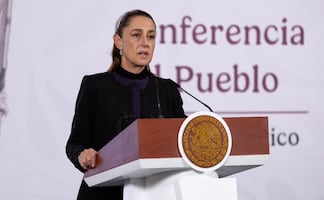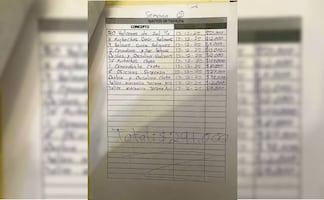Más Información

Narco “La Rana”, entre altar a la muerte, corridos de Los Rayos del Norte, drogas y armas doradas; EU difunde foto de como vivía

Sheinbaum ajusta horario de conferencia mañanera este 26 de febrero; se realizará desde Mazatlán, Sinaloa

Ellos son “La Rana” y “Aquiles”, hermanos Arzate-García, jefes del Cártel de Sinaloa; EU los busca por narcoterrorismo

La narconómina de "El Mencho": claves, sueldos y flores para San Judas; esto ganaban pistoleros, "halcones" y "comandantes" del CJNG
It was a Thursday afternoon of surprises, violence, fear, lies, and disinformation.
After Ovidio Guzmán López , son of Sinaloa Cartel founder Joaquín El Chapo Guzmán , was detained by Mexican authorities in Culiacán , gunmen took the entire city hostage, blocking roads with burning cars while they laid siege to the house where the drug trafficker was held, until the government of President Andrés Manuel López Obrador ( AMLO ) decided to release him on the grounds of avoiding a bloodshed .
Read more about the arrest and release of Ovidio Guzmán .
The operation to capture Ovidio—allegedly by a United States Drug Enforcement Administration ( DEA ) extradition request—resulted ill-designed since the beginning.
The Mexican Army , National Guard , and federal prosecutor units involved were detected by the wide-ranging network of spies and informants from the Sinaloa Cartel ; in contrast with similar high-level actions, they lacked aerial support and no efforts were made to immediately transfer Ovidio to Mexico City .
Descending from the northern mountain range town of Badiraguato — El Chapo 's birthplace—and from Navolato to the west, more than 200 heavily armed gunmen with .50 machine guns mounted in armored trucks , assault rifles , and sniper rifles rapidly surrounded the upscale central neighborhood of Tres Ríos , where Ovidio was detained with three other people, probably including his older brother Iván.
At the same time, 51 inmates —among them murderers and kidnappers —escaped from the state prison of Aguaruto, and started stealing civilian cars to reinforce 19 road blockades across Culiacán .
During the following hours, amid a wave of rumors about threats to unleash a carnage in the housing units of public officials, an extraordinary secret negotiation took place between cartel leaders and federal authorities .
The initial report from Alfonso Durazo Montaño , secretary of Public Security and Civilian Protection , remarking that officers arrested Ovidio by a mere coincidence, was soon replaced with the astonishing announcement that the Chapito was released in order to safeguard the “ integrity and tranquility ” of Culiacán , a city of nearly one million inhabitants.
A week later, there are more questions than answers regarding the facts, due to AMLO ’s insistence on defending his decision to prevent an “ extermination " referring to his criticism as mere “ fascistoid ."
He has repeatedly denied that the government was humiliated by criminals , underscoring its priority of preserving lives and human rights, ignored in past administrations.
In response to right-wing opposition in Congress, AMLO highlighted that “human life is above the laws,” although security forces would try to detain Ovidio again “if there is an arrest warrant,” and without “collateral damage” putting the civilian population at risk.
Without information
Despite recent comments declaring that Mexican presidents “know everything happening in the country,” he said he was not previously informed about the operation in Culiacán .
To be fair, AMLO ’s erratic and contradictory policies provide clear evidence of the power and impunity enjoyed by organized crime in the last 30 years at least, as well as the futility of the U.S. assistance through the Mérida Initiative , established in 2007 .
reported in 2015 that Nemesio Oseguera El Mencho , leader of the Cártel Jalisco Nueva Generación , was released after his capture three years before, due to the violent reaction of gunmen which blocked 22 roads in Guadalajara and other areas in the state of Jalisco .
In 2010 , an exhaustive NPR News investigation “found strong evidence of collusion between elements of the Mexican army and the Sinaloa Cartel ” in the border city of Juárez .
The investigation also suggested that the criminal organization, which exerts influence along Mexico’s northern and central Pacific coast, as well as Nuevo León , Sonora , and Quintana Roo , depended on bribes to top government officials to help their leaders elude capture and keep their operatives out of jail.
“The analysis showed that the Mexican government crackdown has not hit the Sinaloans as hard as it has other cartels,” said NPR News ; a former U.S. counterintelligence agent added that the administration of then-president Felipe Calderón “may be playing favorites with the Sinaloans, but if that’s true it could be a standard law enforcement strategy to attack organized crime syndicates.”
Joaquín El Chapo Guzmán
(62 years old) is currently serving a life sentence plus 30 years in the U.S. “ supermax ” federal prison known as the “ Alcatraz of the Rockies ” near Florence , Colorado .
Some experts think that the Sinaloa Cartel is now headed by his children Alfredo (36), Iván (36), and Ovidio (28), with the support of veteran Ismael El Mayo Zambada (71), classified by the DEA as Mexico’s most enduring and powerful drug lord .
Meanwhile, people in Culiacán are returning to normalcy, after the “ war ” that left 8 dead , 14 wounded , and damages in the millions . “We do not know what will happen, the president has not said what is next; there is a strained, confusing environment,” said Sinaloan journalist Gabriela Soto .
She told EL UNIVERSAL English that the Sinaloa Cartel is the “big loser” in this story since its public image was affected. “We did not see that before, people now realize it is not as they think. There are questions raised by society,” she stressed.
However, Soto acknowledged that Culiacán “is divided between groups which idolize the cartel and the narco culture and other 50% which rejects it, yet are used to live with this.”
As other journalists and experts on the matter, she is still surprised by the costly errors and the government’s unusual lack of information regarding the logistics, troop numbers, and firepower of the drug traffickers , taking into account that the “surgical operations” launched in Sinaloa to detain former Chapo’s wives María Alejandrina Salazar ( 2005 ) and Griselda López ( 2010 ) were considered a success without the loss of life.
Read more about Mexico's bloodiest cartels .
Editing by Sofía Danis
More by Gabriel Moyssen
Noticias según tus intereses
[Publicidad]
[Publicidad]












